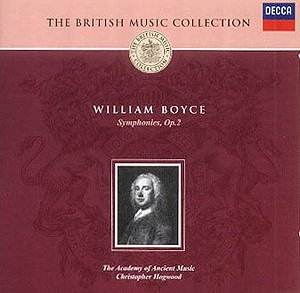Boyce’s Symphonys – his spelling – make a welcome return to the
catalogue in Christopher Hogwood’s spirited, intelligent and perceptive
reading dating from April 1992. A decade on the virtues of interpretation
are palpably undiminished; Trevor Pinnock may have recorded them earlier,
the first period instrument performance on disc, but Hogwood’s has proved
the more recommendable. The Symphonies derive from sundry overtures written
over a period of years and derived from odes and theatre works and were
not therefore specifically written for the medium in the modern accepted
sense. In their directness, tunefulness and melodic distinction these
are probably the greatest works in this style by an English composer in
the eighteenth century. Boyce ranges widely from stately formality to
earthy wit via a species of Handelian splendour and a hint of reserve
and melancholy. Formally these are not the simple pleasantries one might
expect of this somewhat transplanted genre; there are numerous examples
of stylistic quirkiness and the fusion of genres and influences is very
much to the works’ advantage. When, for example, Boyce indulges a fugue
it doesn’t last very long but is entirely apt; when he mixes French and
Italian style it is of a peace with his musical generosity in the widest
sense.
Hogwood is excellent in delineating orchestral clarity.
The string division in the first movement on No 1 is a case in point.
Maybe the phrasing in the slow movement is a little clipped for my taste
but it’s ineffably alive as is the directness and lower string harmonies
in the Allegro assai of No 2; splendid oboes, solo violin and staccato
phrasing garnish the movement with real panache. I sense a very slight
gracelessness in the phrasing of the Presto allegro finale however.
How well though Hogwood elucidates the superficially pleasurable opening
movement of No 3. There’s nothing strident or didactic about the way
he uncovers, not exposes, the harmonic roots of the movement whilst
allowing the melodic argument full expression. And equally fine is the
way he plays up the oboe/bassoon sonorities in the second movement;
his characterisation is excellent and he properly understands the contemporary
value of the marking vivace, which has undergone a change over the years;
in Boyce’s time it meant a speed above an andante.
The opening allegro of No 4 is delightfully sprung.
The gravity of the middle movement is deeply considered with its bassoon
rich sonority but it is simply too slow and the one occasion I took
exception to his tempo decisions which are otherwise sound and practicable.
No 5 is suitably martial and declamatory, the Largo-andante opening
of No 6 full of Hogwood’s talent for revealing detail with entry points
well clarified and effervescently chugging bassoons. The larghetto is
full of finesse. No 7 opens in Handelian glory, its build up and release
of tension a real symphonic coup and its nobility of utterance undisguised.
Gravity and elevation open the final Symphony with Hogwood rightly alluding
to the perhaps slightly unsettled feelings of the andante. Animated
string figuration pushes the finale onwards gathering the comically
lugubrious woodwind into a final peroration. Splendid music and a splendid
disc.
Jonathan Woolf


